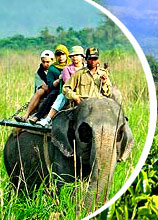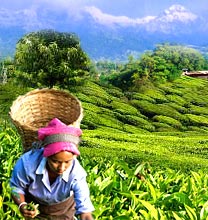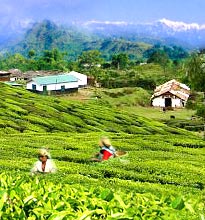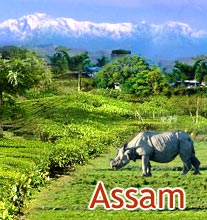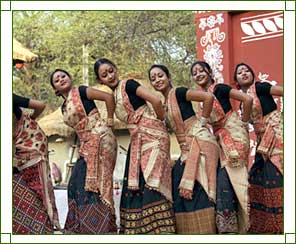 Location: Throughout Assam
Location: Throughout AssamTime Of Celebration: January, April and October
The most important and enchanting festival of Assam is Bihu, which is also its state-festival. The word Bihu originated from the Sanskrit word Vishu and is celebrated three times a year, marking the change of season in accordance with the Assamese calendar. The major occupation of the people of Assam being farming, a separate solar calendar is used here. According to this calendar, the Assamese New Year usually falls on the 14th of April, which marks the advent of the spring season as well as the celebration of the most important Bihu - Rongali Bihu. Kongali Bihu falls in mid-October, while Bhogali Bihu comes in mid-January.
Rongali Bihu (Bohag Bihu)
This is the most famous and important of all the three Bihu festivals. Celebrated at the onset of the spring season, Rongali bihu is observed over a period of seven days. As the name suggests, Rongali means color, joy and happiness. The first day of the festival is called Goru bihu. Goru or cows, being a sacred animal in India, are worshipped on this day. They are smeared with a paste of halodhi (turmeric), moong daal (pulses) and twigs, which acts as a disinfectant. Traditional songs like lao kha, bengena kha, bosore bosore badhi jaa are sung, as the cows are fed with a meal of gourd and brinjal.
The second day of Bihu is called the Manuh bihu and marks the New Year of the Assamese people. Respect is conferred to the elders and love is bestowed upon the young ones. New clothes are worn and Gamoshas and Japis are given to elders, as a token of respect. The womenfolk can be seen wearing the traditional attire - Mekhela Chaddar. A sumptuous meal called bihu kabo loi is prepared in every house, accompanied by traditional delicacies like pitha and laddoos. Thus, amidst games, joys, and merry making, the days of Rongali bihu, are spent by the Assamese people.
Kongali Bihu (Kati Bihu)
Kongali bihu is held in the month of kati (11th month of the Assamese calendar) or mid October. This is a silent affair, as farmers pray to the Gods for a good harvest. Earthen lamps are lighted in every corner of the house and prayers are offered to tulsi (Holy basil), a revered plant in India. The tulsi plant is raised over an earthen platform, called tulsi bheti in the local dialect, and is watered and worshipped every day. Prayers are also offered in the paddy fields, by lighting a special type of lamp called ‘Akaxh Banti’ (sky candle), which is lit high up on the tips of tall bamboo. The practice of lighting lamps in the paddy fields has a beneficial effect, as it makes the crops pest-free by attracting them and making them fall into the fire of the lamp.
Bhogali Bihu (Magh Bihu)
The harvest festival or Bhogali Bihu is celebrated in the month of January (Magh month according to the Assamese calendar). It is a two-day event and the whole festival is spent amidst merry making and feasting (Bhogali means feast in Assam). ‘Uruka’ is the first day of the festival and is devoted to the God of fire, Agni. A grand feast is held at night and ‘mejis’ or ‘bhelaghars’ are put up in open spaces, using bamboo and wood. Most people stay awake overnight, listening and dancing to the tunes of traditional Assamese music.
The next morning, people wake up early to offer their prayers to Lord Agni, by lighting up the ‘mejis’. All the family members sit around the ‘meji’ and eat pithas and ladoos. The young people then ask the blessing of their elders and finally come back home carrying pieces and ashes of the burnt fire wood, scattering them over the trees and plants for better results. In certain rural areas, animal fights, like buffalo fight and cock fight, and tekeli bhonga (pot breaking) are held for fun, as a part of the Bhogali Bihu celebrations.

